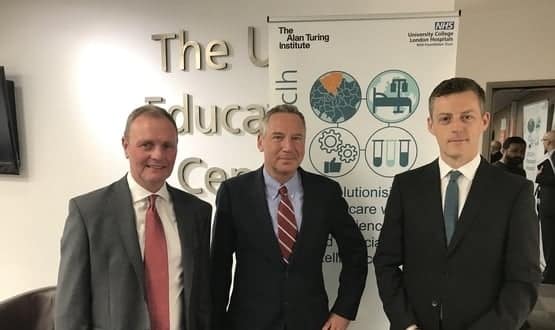University College London Hospital explores AI possibilities
- 29 May 2018

University College London Hospital (UCLH) has announced a new partnership with The Alan Turing Institute to explore how artificial intelligence (AI) can support clinical decision making.
The initial focus of the partnership with the Institute – which researches how AI can be used to solve everyday problems – will be A&E.
A significant number of hospitals across the UK, including UCLH, are struggling to meet the four-hour A&E target set by NHS England.
Marcel Levi, UCLH chief executive, said the hospital’s performance this year “has fallen short” of national targets which is “no reflection on the dedication of staff” but rather “an indicator” of failings elsewhere such as patient flow.
The hope is that AI will make it easier to identify patients presenting with symptoms which do not generally prove to be serious. Levi explained the idea is to spot patterns from thousands of real-life scenarios.
For example, if a patient comes to A&E with abdominal pain, the usual response is to check their blood plus order x-rays and scans. But according to Levi, in around 80% of those cases, the patient is ultimately discharged for home management.
He added: “What, if through analysis of thousands of similar scenarios, we were able to identify patterns in the initial presentation of the 20% with serious conditions, such as intestinal perforation or severe infections?
“This could enable us to fast track them through to a scan and a swift diagnosis and could support clinical decision making to manage the 80% who need no further clinical input more effectively.”
Another objective of the partnership, which was arranged by the NIHR University College London Hospitals Biomedical Research Centre (NIHR UCLH BRC), is to look into the flow of staff and patients through the hospital.
The NIHR UCLH BRC research team along with staff from The Alan Turing Institute will explore the possibility of applying AI and machine learning techniques to large existing data sets on how people move through the departments of the hospital.
It is hoped their analyses will track down bottlenecks, hurdles and downtime in how the hospital operates, which can then be tackled to improve efficiency and help patients get seen faster and more effectively.
Levi said: “With ever-increasing numbers of patients and ongoing financial pressures, we need to try something different, something innovative, something longer term.
“The partnership with the Alan Turing Institute provides an opportunity to work with the world’s leading data scientists to do just this.”
A series of announcements and partnerships surrounding AI have been made in the last few weeks.
On 21 May, the Prime Minister announced that she hopes the UK will use “data, artificial intelligence and innovation” to transform the way diseases like cancer, diabetes, heart disease and dementia are diagnosed by 2030.
Then on 23 May, Digital Health News reported on the news that Microsoft has partnered up with Great Ormond Street Hospital (GOSH) to support their research of AI.




